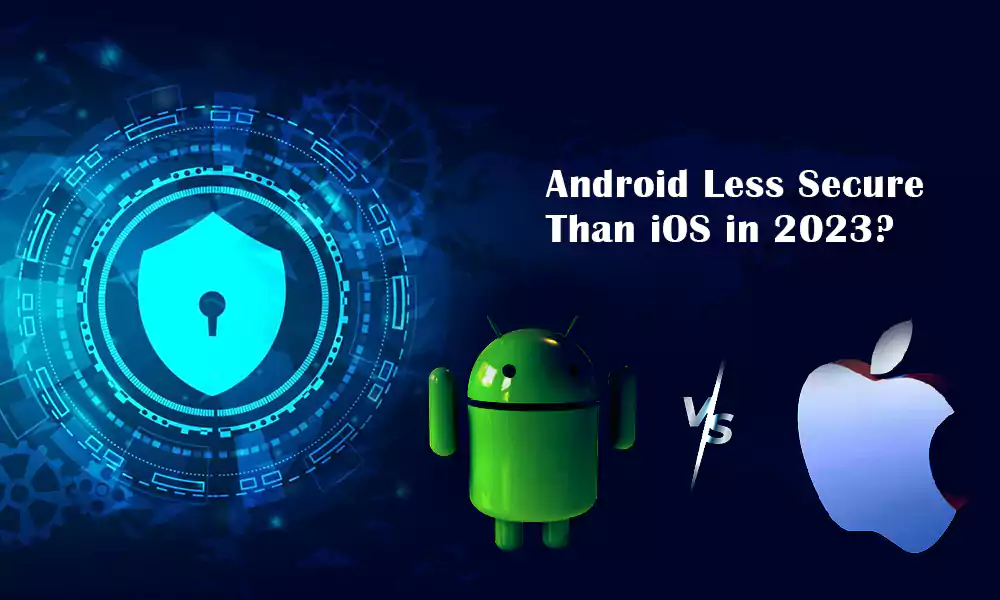For decades, Apple products have maintained a reputation for lower malware infection rates than their non-Apple counterparts. PCs seem to have dramatically higher numbers of infections than Mac computers, and phones running Android operating systems seem to succumb to malware much more easily than iPhones. However, as the year 2023 dawns, it is high time that assumptions about the invulnerability of Apple products are properly investigated.
More people than ever are investing in Apple products, and as mobile traffic grows exponentially, Android users deserve to know if they’re using an inferior and radically more insecure tool to browse the web, make e-commerce purchases, play digital games, and more. Here’s the lowdown on Android and iOS security in 2023.
One of the most popular tests that Apple users use to prove the weaker security of Android devices is the fact that there is much more malware being developed and deployed to attack Android users. Unfortunately, this is true; Researchers time and time again find millions more instances of malware affecting Android systems than their iOS counterparts. However, the main reason for this might not be as damning as iOS users believe.
The main reason why so many cyber attackers prefer to create and run malware for Android devices is simply that there are far more Android users than iOS users. Worldwide, there are more than 1.2 billion iPhone users, but there are more than twice that number, approximately 2.5 billion Android users. All workers want their effort to have the biggest impact possible, and the same goes for cybercriminals, who are more likely to see higher infection rates with malware designed for Android devices.
It’s worth noting that Android is a bit easier to exploit than iOS, because Android offers open access to its source code to help developers create useful apps. The number of apps available to Android users is far greater than the number of apps that can run on Apple devices, and many beginning app developers find it easier to experiment with Android code before trying to port their idea to iOS. Many Android users see the open nature of the operating system as a strength; still, the closed development operating system maintained by Apple helps iOS keep its users somewhat more secure against attacks. This is probably why iOS’s security reputation remains strong to this day.
The number of iPhone users around the world is constantly increasing, and the relative wealth of iPhone users often encourages cyber attackers to put more effort into malware designed for Apple devices. There might come a day in the near future when the amount of malware online is roughly equivalent for both Android and iOS, but unfortunately, that day is not today. Android users, in fact, need to work harder to be secure than iOS users.
Android users are not doomed to endless malware infections. Although cyber attackers are eager to infiltrate Android devices and obtain valuable data, Android users can thwart them with the right tools and techniques.
For starters, all Android users should equip their mobile devices with proper mobile security solutions. Android antivirus apps from reputable cybersecurity firms will operate in the background of the mobile device, looking for signs of malicious code and quarantining known malware before it can do any harm. While antivirus tools shouldn’t be a user’s only method of keeping their mobile device and data safe, they are essential to quickly identify and remove malware.
Just as important as mobile cybersecurity solutions is the behavior of an Android user. Irresponsible mobile activity is likely to expose mobile users to a more significant amount of mobile malware, making it more important than ever for users to learn and practice cyber hygiene. Cyber hygiene is a set of habits maintained by an individual that tends to keep their devices safe from attacks. Like regular hygiene, cyber hygiene should be used every day, every time a person uses a device, to prevent that device from succumbing to some kind of digital infection. Some examples of cyber hygiene practices for mobile device users include:
Avoid risky connections. A device is at higher risk of being attacked when it is connected to an insecure network. Public Wi-Fi networks can harbor any number of cyber attackers, so Android users should only connect to public Wi-Fi networks using a VPN or some other security tool that protects their connection. Also, users should be careful to avoid chargers and other cables that may come from an unreliable source.
Use a strong PIN or password to limit access. A PIN shouldn’t be easy for anyone to guess. Users should avoid regular PINs, as one or two numbers are repeated, and should avoid using birth dates or other easy-to-discover number sequences. Blocking access to a mobile device is a small but significant way to thwart opportunity attacks.
App download from approved stores. There are many places on the web where users can find pirated and third-party apps designed for mobile devices, but these apps pose a significant security risk to the device. The app stores maintained by Google rigorously test the available apps to ensure that they are free of malware and issues.
Deactivation of functions when not in use. It is not necessary to turn off mobile devices such as laptops or desktop computers, but users should disable certain types of connections when they are not needed. For example, users can disable Wi-Fi, GPS, and Bluetooth connections while in public; these features make it easier for hackers to successfully identify and attack devices. Users can also remove apps they no longer use to reduce the potential for software vulnerabilities on their devices.
Allow automatic app updates. As software ages, it tends to develop vulnerabilities that clever cyber attackers will exploit to gain access to user devices and data. Most software developers release regular updates to remove potential vulnerabilities, and when users allow applications to update automatically, they receive the benefits of those updates immediately without any drop in security. Also, the Android operating system needs to be updated occasionally, and the sooner users allow the update to download and install, the better.
Recognition of phishing signals. Not all cyber attackers are hacking experts; many know only the basics of programming and instead gain access to user accounts by tricking them into divulging sensitive information. Most phishing scams are easy to spot, thanks to misspelling or grammar, but the user should also avoid entering data such as login credentials, social security numbers, or contact information on websites they didn’t navigate to independently.
Comparing the security of Android and iOS is like comparing apples to oranges. Both are popular mobile operating systems, just like apples and oranges are fruits, but there are very different circumstances that affect the security of each operating system. In truth, both Android and iOS users should invest in cybersecurity solutions and practice strong cyber hygiene while using their mobile devices. Mobile malware rates are increasing across the board, and every user needs to know how to keep their mobile data safe.
Categories: Technology
Source: SCHOOL TRANG DAI



